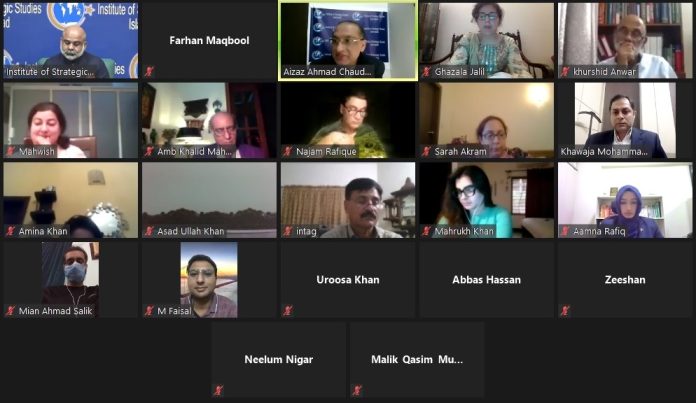Press Release
Webtalk
“Changing Global Dynamics of Cyber Threats and their
Impact on National Security”
September 11, 2020
“We live in a different world today where cyber offensive capabilities are reshaping the national and international landscape,” stated Mr. Farooq Naiyer, Cyber Security expert from Canada. He was the key speaker at the webtalk held by Arms Control and Disarmament Centre (ACDC) at the Institute of Strategic Studies, Islamabad (ISSI) on “Changing Global Dynamics of Cyber Threats and their Impact on National Security” held on September 11, 2020.
Malik Qasim Mustafa, Director ACDC-ISSI, in his introductory remarks said that since the last decade the cyber threats have started to emerge as a significant risk to national security. The nature of such threats has transformed from a common cyber-attack or hacking incident by an individual or group to the development of defensive and offensive cyber warfare capabilities by states. The Indian cyber-attack threats are growing against Pakistan. There are reports that India with the cooperation of Israel has stepped up its efforts to strengthen its offensive cyber warfare capabilities against Pakistan. Therefore, the aim of this talk is to help formulate policy-relevant recommendations.
In his welcome remarks, Amb. Aizaz Ahmad Chaudhry, Director General ISSI, said that in the contemporary security landscape, cyberspace is a strategic asset which is being used by a variety of interconnected actors for a variety of purposes like e-governance, e-banking, e-commerce, communication, etc. This increasing dependency is not only creating new avenues of cooperation and opportunities but also making us more vulnerable to a variety of new threats from low-level individual crime to serious crime by political and ideological extremist organisations with or without state sponsorship. Since the start of coronavirus pandemic, we have seen a massive wave of cyber-attacks. The World Health Organization (WHO) has reported a five-fold increase in cyber attacks. A major cyberattack by the Indian intelligence agencies was launched on Pakistan. This highlights the need for cybersecurity for Pakistan.
Mr. Farooq Naiyer, further said that both state actors and non-state actors are operating in cyberspace and well as using offensive cyber capabilities which have blurred the line between threats posed by states and non-state actors. In the majority of cases, civilian infrastructure is targeted. He emphasised that telecommunication is the field mainly under attack from cyber threats. He identified three kinds of threats – banking trojan, malware downloaders, and ransomware. In recent years and months, there have been cyber attacks on major infrastructure in New Zealand, Australia, Israel, Iran as well as Pakistan. He pointed out that cyber threats have gone up many folds across the world and can affect Pakistan as well. In this regard, Pakistan is taking actions to deal with cybercrime and cyberthreats but needs to take more organised action. He also highlighted that cyberthreats are linked with the evolving geopolitical situation. Tensions between India and Pakistan, foreign policy choices, and the evolving Middle East situation are all linked with cyberattacks. Calling it the 5th generation warfare, he said that potential targets in Pakistan could be critical government and private sector infrastructure as well as strategic initiatives like China Pakistan Economic Cooperation (CPEC). He stressed that cyber threats are a clear and present danger and we need to organise ourselves to deal with it.
Khawaja Mohammad Ali, Chief Information & Cyber Security Officer, Agriculture Development Bank of Pakistan (ADBP), Islamabad as a discussant on the issue said that warfare has moved from air and land to cyberspace. He emphasised the need for civil-military cooperation to tackle this issue. In conventional warfare, the military triad can operate independently and safeguard our borders but cyberspace has no boundaries and is harder to safeguard. He highlighted the need to secure Pakistan’s defence capabilities in the cyberspace as well as to safeguard critical infrastructure of the country. He recommended aligning with friendly countries to tackle the issue of cybersecurity as well as exercising cyber diplomacy.
The second discussant, Ms. Aamna Rafiq, Research Associate ACDC-ISSI, highlighted the need to enact an international cybersecurity regime. She said the past efforts to negotiate such a regime had not come to fruition due to a number of issues like difference over centralised cyber control versus open space, need to work within existing international law or enact a new set of rules to deal with cybersecurity challenges.
Ambassador Khalid Mahmood, Chairman BoG ISSI, in his concluding remarks, said that the technology is inexorably progressing. He quoted the Russian President, Vladimir Putin, who said that a nation that leads in artificial intelligence will lead the world. The concept of security has expanded. Cybersecurity is now part of national security that is all-encompassing. Threats in cyberspace are having an impact on conventional military defence and perhaps on nuclear capabilities. India and Pakistan as nuclear-weapon states are vulnerable to cyberattacks. Unless the threat is managed, it has the potential to undermine strategic stability. He emphasised the need to have laws at the national, regional and international level to manage cyber threats.












